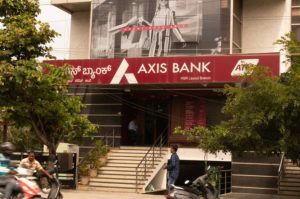Calcutta High Court Axis Bank Ruling: Public Money Oversight
Calcutta High Court Axis Bank Ruling: On May 12, 2025, the Calcutta High Court issued a pivotal ruling in a case that has drawn nationwide attention for its implications on banking transparency and judicial authority. In a strongly worded order, the court directed Axis Bank, a major private financial institution, to pay ₹25 lakh in compensation to the Society for Welfare of the Handicapped Persons, a non-profit organization that was allegedly subjected to years of harassment due to the mishandling of funds. The court’s decision underscores a larger principle: private banks are not immune to legal accountability when they manage public money or funds intended for public welfare.

The ruling also mandates the Reserve Bank of India (RBI) to form a high-level committee within a week to investigate Axis Bank’s alleged non-compliance with the Banking Regulation Act, 1949, and multiple RBI circulars. This case has become a landmark moment in India’s financial legal landscape, highlighting judicial oversight in the private banking sector.
Background of the Case: Fraudulent Account in NGO’s Name
The origins of the case can be traced back to a disturbing discovery made by the Society for Welfare of the Handicapped Persons, a respected non-governmental organization based in Kolkata that provides assistance and support to individuals with physical disabilities. The NGO relies heavily on public donations, grants from the West Bengal government, and contributions from philanthropic entities to sustain its outreach programs.
In 2011, the organization became aware that a fraudulent bank account had been created in its name at the Axis Bank Prince Anwar Shah Road branch. This fake account had allegedly been used to conduct unauthorized transactions involving funds that were meant for the NGO. What shocked the organization was that a significant portion of their donations had been diverted into this account—funds that were never reflected in any of their four authorized bank accounts.
Despite filing a police complaint and approaching various authorities, the case languished in bureaucratic and legal limbo for more than a decade. No concrete action was taken against the bank, and the NGO continued to suffer reputational and operational harm. It was only after the matter was brought before the Calcutta High Court that the issue gained momentum.
Judicial Observations: Holding Private Banks Accountable
Delivering the verdict, Justice Partha Sarathi Sen made several crucial observations that now form the crux of the Calcutta High Court Axis Bank ruling. He stated unambiguously that private sector banks are not exempt from judicial scrutiny when they handle public funds, especially in cases where their negligence leads to direct harm to public-serving institutions.


Justice Sen invoked Section 35A of the Banking Regulation Act of 1949, which empowers the Reserve Bank of India to issue guidelines in the interest of the general public and to curb banking malpractices. According to the court, Axis Bank had failed to follow standard due diligence and regulatory norms issued by the RBI, thereby enabling the creation and operation of a fraudulent account in the name of a charitable organization.
The judge remarked:
“The bank cannot escape its responsibilities when dealing with public money, especially when it directly affects institutions working for the marginalized.”
The ruling further emphasized that such negligence not only causes financial harm but also undermines public trust in the banking system.
Compensation Order and Timeline
As part of the verdict, the Calcutta High Court ordered Axis Bank to pay ₹25 lakh to the Society for Welfare of the Handicapped Persons as compensation for the harassment and financial obstruction it suffered. The amount must be disbursed within 30 days of the judgment, failing which legal and financial penalties could be imposed.
This compensation is meant to serve two purposes:
-
Provide relief to the NGO for the damage caused over more than a decade.
-
Serve as a deterrent for other private banks that fail to implement or comply with RBI regulations.
This is the first time a High Court has explicitly stated that judicial authority extends to private banks when public interest is at stake, marking the Calcutta High Court Axis Bank ruling as a legal milestone.
RBI’s Role and Institutional Oversight
The court did not limit its observations to Axis Bank alone. Recognizing that systemic oversight is essential to prevent such incidents in the future, the Calcutta High Court directed the Reserve Bank of India to constitute a high-level committee within seven days of the order.
This committee will be tasked with:
-
Investigating the specific case involving Axis Bank and the fraudulent NGO account.
-
Examining whether there was systemic negligence or willful non-compliance of RBI directives.
-
Recommending stronger regulatory mechanisms for handling accounts of public institutions and NGOs.
-
Proposing punitive action if necessary under the Banking Regulation Act.
This move by the court is expected to set the tone for stricter RBI vigilance on private sector banks, particularly regarding how they manage funds related to public welfare.
Wider Impact: Banking Sector Reacts to the Calcutta High Court Axis Bank Ruling
The Calcutta High Court Axis Bank ruling has sent shockwaves through the Indian financial sector. Experts believe it could lead to a paradigm shift in how private banks approach compliance, especially with regard to customer verification, monitoring of suspicious transactions, and opening of institutional accounts.
Multiple banking associations and legal experts have weighed in on the judgment. According to Professor Alok Ranjan, an expert in financial law at Jadavpur University:
“This ruling acts as a clear warning. Banks can no longer claim insulation from judicial review under the guise of private enterprise if they are handling money meant for public good.”
Moreover, several NGOs and civil society groups have welcomed the ruling, calling it a victory for transparency and accountability in the financial system. They have urged the RBI to implement stricter Know-Your-Customer (KYC) procedures for accounts opened in the names of non-profits and trusts.
olitical Reactions: A Wake-Up Call Across Party Lines
The Calcutta High Court Axis Bank ruling has drawn reactions from political leaders across the spectrum. While the ruling itself is not political in nature, its implications have stirred debates about financial regulation, institutional responsibility, and the treatment of civil society organizations.
Trinamool Congress leaders in West Bengal welcomed the ruling, with State Finance Minister Chandrima Bhattacharya stating that it reinforces the state’s long-standing call for stricter regulations on private banks dealing with public interest funds.
On the national level, Congress spokesperson Jairam Ramesh said:
“This is not just a case about a private bank’s negligence. It’s about how our financial institutions interact with vulnerable sectors. The judiciary has rightly intervened.”
From the Bharatiya Janata Party (BJP), reactions were more measured. BJP leader and economist Subramanian Swamy lauded the judiciary for upholding the spirit of accountability but added that the RBI should have acted much earlier:
“The RBI cannot wash its hands of responsibility. Its lax oversight allowed this fraud to go undetected for years.”
Legal Implications and Calls for Reform
The Calcutta High Court Axis Bank ruling has not only provided immediate relief in the current case but may also serve as a judicial precedent. Legal experts believe the judgment can be cited in future cases involving private banks handling public money, especially where systemic lapses are observed.
Lawyers practicing before the Supreme Court have suggested that:
-
Section 35A of the Banking Regulation Act may now see broader interpretation and application.
-
Public interest litigations (PILs) may increase against private banks in similar contexts.
-
NGOs, trusts, and public interest groups may file class-action suits in cases of institutional misconduct.
In response, there have been increasing demands for:
-
A banking ombudsman exclusively for the NGO sector.
-
Mandatory periodic audits of accounts opened in the name of charitable or government-funded institutions.
-
New compliance frameworks to be developed jointly by RBI, SEBI, and Ministry of Finance.
Media Coverage and Public Discourse
Newsrooms and digital platforms have given prominent space to the Calcutta High Court Axis Bank ruling. Most national dailies carried editorials highlighting the bravery of the NGO in continuing a decade-long legal battle and the importance of a judiciary that supports the voiceless.
A Times of India editorial said:
“It is a sharp reminder that justice delayed is not always justice denied—if the courts are willing to act decisively.”
Social media has also erupted with support for the NGO, with hashtags like #AxisBankRuling, #JusticeForNGOs, and #BankAccountability trending across platforms.
This wave of support has reenergized civil society conversations around banking transparency, particularly in the digital age where online fund transfers and cyber fraud are rampant.
Conclusion: Calcutta High Court Axis Bank Ruling as a Defining Moment
The Calcutta High Court Axis Bank ruling has set a vital precedent for financial justice in India. In an environment where private financial institutions often operate with relative impunity, especially when dealing with entities that lack legal firepower, this ruling brings the much-needed weight of the judiciary into the equation.
It reasserts that any financial institution, whether public or private, is bound by accountability when public welfare or public money is involved. The ₹25 lakh compensation, while symbolic, is an important first step toward restoring faith in the system.
This case will likely go down as a landmark in Indian legal and banking history, compelling not just Axis Bank but the entire private banking ecosystem to re-evaluate their compliance protocols, ethical responsibilities, and regulatory alignment with the RBI.
Official References and Further Reading
For readers seeking to verify official sources or understand the legal and regulatory frameworks mentioned in this article, the following links may be helpful:
-
🔹 Reserve Bank of India (RBI) – Official Website
For circulars, compliance guidelines, and banking oversight responsibilities. -
🔹 Calcutta High Court – Official Website
To explore more about the court’s jurisdiction, rulings, and latest orders. -
🔹 Banking Regulation Act, 1949 – India Code
For the complete legal framework under which banks operate and courts intervene. -
🔹 Axis Bank – Official Website
For Axis Bank’s official statements, grievance redressal policies, and corporate information.
Also read: Home | Channel 6 Network – Latest News, Breaking Updates: Politics, Business, Tech & More

